Who: Dr. Christina S. McCrae, professor in the MU Department of Psychiatry and director of the MizZzou Sleep Research Lab.
Bio: Dr. McCrae grew up in Mifflintown, Pennsylvania and earned her undergraduate degree from Penn State University before earning her 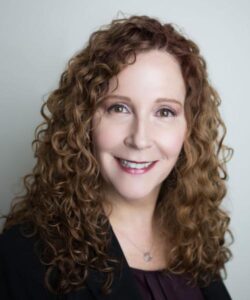
What are your research Interests?
“My work in the area of autism is relatively recent, but stems logically from my longstanding interest in comorbid insomnia and the impact of treatment for insomnia on co-occurring disorders. I am a licensed psychologist who is board certified in behavioral sleep and I have a background in clinical psychology with specialized training and expertise in cognitive behavioral therapy (CBT) and behavioral sleep medicine. In 2005, I completed the NIH/OBSS training program on the conduction of randomized controlled trials (RCTs) involving behavioral interventions. Since 1999, I have been involved in the conduction of multiple federally-funded RCTs involving CBT.”
How did you first get involved with autism research?
“When I moved to MU in 2015, I began collaborating with former Thompson Center researcher Dr. Micah Mazurek on adapting a cognitive behavioral treatment for insomnia for typically developing children to children with autism. The treatment we adapted was one that I had developed and used while at the University of Florida.”
What is one thing do you hope to discover or understand better by the end of your career?
“The role of sleep in autism and other chronic disorders that are highly comorbid with insomnia. Perhaps even more importantly, I want to expand my research beyond the development, adaptation and initial testing phases to widespread dissemination to ‘real world’ patients and providers. Often, treatments are developed and tested and the results are published in a scientific journal….and that’s it. By the end of my career, I really want to starting moving those interventions off-the-shelf and out-of-the-journal to reach the patients that need them and train real world providers to deliver them.”
What motivates you to work so hard in this field?
“First, I have always valued the importance of sleep as a foundational health behavior. As a society, we have long recognized the importance of diet and exercise, but have only recently started paying more attention to sleep. I hope to see increased awareness of the importance of sleep and the positive effects of improving sleep on health in individuals of all ages with chronic conditions and disorders. Second, in recent years I’ve increasingly become interested in sleep in children, particularly children with autism, and the importance of establishing and maintaining good sleep early in life. As part of that work, I’m also motivated to work with families because improving the sleep of children can have important carryover effects to parents as well as other family members. Finally, while medical and pharmacological interventions are important aspects of health care, I am very motivated to develop and research non-drug, behavioral treatments and to demonstrate that those can also prompt significant and long-lasting, positive changes in the functioning of the body and the brain.”
Learn more about the Mizzou Sleep Research Lab
The Mizzou Sleep Research Lab investigates the mechanisms underlying normal and pathological sleep, the link between sleep and cognition, the daily variability inherent in sleep and sleep-related behaviors and the efficacy and effectiveness of cognitive-behavioral interventions to treat insomnia in diverse populations. Those populations include children with Autism Spectrum Disorders, overweight and obese people of all ages, senior citizens, dementia caregivers and sufferers of ailments that include pain, cardiac disease, cancer, and end-stage renal disease. As a result of these research emphases, we collaborate with a broad range of investigators that specialize in aging, autism, cardiology, cognition, immunology, neuroimaging, neurology, nursing, obesity, pain, psycho-oncology, rheumatology and sleep medicine. The Mizzou Sleep Research Lab, directed by Dr. Christina McCrae, is part of the Department of Psychiatry at the University of Missouri School of Medicine.

 expand its examination of the efficacy of various pharmaceuticals in treatment for specific sub-types of autism.
expand its examination of the efficacy of various pharmaceuticals in treatment for specific sub-types of autism.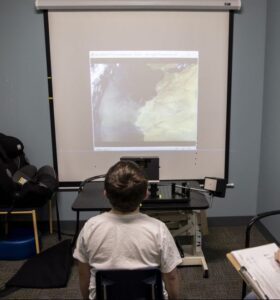 involve a small number of participants, they can be quite time-consuming to conduct, there is often a great deal of regulatory documentation required. The research core plays a key role in this coordination and documentation.”
involve a small number of participants, they can be quite time-consuming to conduct, there is often a great deal of regulatory documentation required. The research core plays a key role in this coordination and documentation.”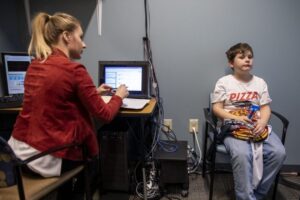 another subset of children with autism. Beversdorf says access to the entire staff of providers at the Thompson Center makes these types of important studies possible.
another subset of children with autism. Beversdorf says access to the entire staff of providers at the Thompson Center makes these types of important studies possible.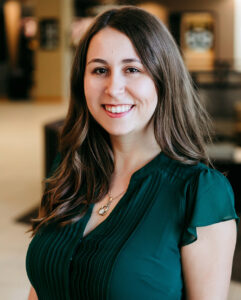
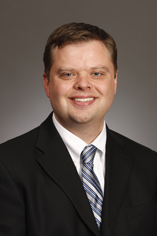

 Applied Behavioral Intervention Service (ABIS) team, Center leaders had an easy time matching our missions to the newest ABIS provider: Dr. Lorraine Becerra.
Applied Behavioral Intervention Service (ABIS) team, Center leaders had an easy time matching our missions to the newest ABIS provider: Dr. Lorraine Becerra.
 year and we’re hoping to provide care that is more concise and coordinated,” Dr. Stroud said.
year and we’re hoping to provide care that is more concise and coordinated,” Dr. Stroud said.